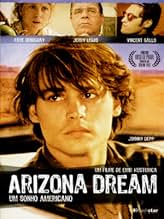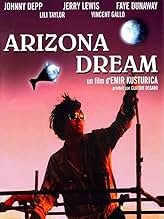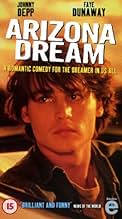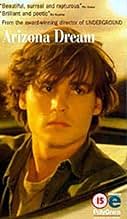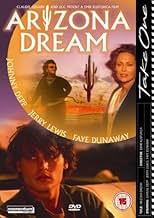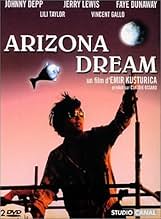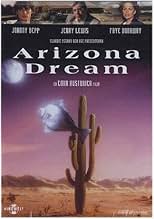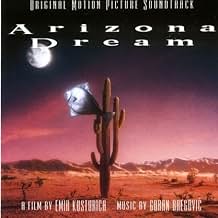A young New Yorker goes to Arizona where he finds freedom to both love and dream.A young New Yorker goes to Arizona where he finds freedom to both love and dream.A young New Yorker goes to Arizona where he finds freedom to both love and dream.
- Awards
- 4 wins & 2 nominations
Polly du Pont Noonan
- Betty
- (as Polly Noonan)
James P. Morrison
- Boatman
- (as James P. Morrison II)
Storyline
Did you know
- TriviaThe first cut of the film was about four hours long. Emir Kusturica gave Johnny Depp a copy of the version.
- GoofsSince the movie took about a year to shoot, Axel's hair length changes drastically throughout the film. In the beginning, when he talks to Paul up until when they arrive at Leo's house, his hair is longer than in the next few scenes when he spends time with his uncle. It's long again when he starts staying at Elaine's house.
- Quotes
Axel Blackmar: But what's the point of breathing if somebody already tells you the difference between an apple and a bicycle? If I bite a bicycle and ride an apple, then I'll know the difference.
- Crazy creditsThe end credits read: "Any reference to Cadillac dealerships or dealers is purely fictional. The Cadillac automobile was selected for the film because it was and continues to represent the epitomy (sic) of American automobile design."
- Alternate versionsOriginally released in Europe at 142 minutes. The USA version was cut down to 119 minutes but the complete version was also released theatrically. Only the short version is available on video in the USA.
- ConnectionsFeatured in Rango (2011)
Featured review
Axel is happy with his life in New York, having long since left what remains of his family behind him in Arizona. When his Uncle Leo is getting married, Axel is forced back home by his friend Paul. He finds his Uncle marrying a much younger woman and, while he wishes to leave as soon as he arrives, he finds himself staying around and selling cars with his Uncle – a job he maintains he has to desire to do. It is on the lot that he meets the dysfunctional mother and stepdaughter Elaine and Grace, the former of which he falls for and begins a relationship that evolves into an obsession with building a flying machine. Meanwhile, in stark contrast to his current desert setting, Axel's dreams continue to centre on an Inuit family and a flat fish with its face all on one side.
Well over a decade ago now I used to make much more of an effort to get to my local cinema. At that time I lived near an independent art-house style cinema that, while it showed all the big releases on its two screens, it did also give over time to smaller independent films. It was here that I saw Arizona Dream – a film that I then never saw or heard of for another ten or so years until for some reason I remembered it and decided to watch it again. I couldn't remember much about it apart from a few scenes, nor if I had liked it or not so to all intents and purposes I was coming to it fresh. I say this but by the end of the film I had certainly remembered why I could recall specific scenes and my enjoyment of them but had no strong memory of the total film – the reason being that the film is at its best in small chunks but fails to work as a whole.
The story is this wonderfully off-the-wall tale of love and dreams that fires out outrageous characters with abandon, allowing for many memorable scenes and quotable lines. It is comic, creative, silly and enjoyable. But it is also a bit tiring. The scenes don't come together as I would have liked and the general air of silliness undermines how much I was able to get emotionally involved and care about where the story was going. That it is almost two and a half hours long only serves to highlight this and it really does feel indulgent and unwilling to give anything up. The fault for this certainly lies with Kusturica as writer and director. He certainly has a creative flair to him, an ear for dialogue and an eye for a shot but his approach fragments the film and he doesn't manage to pull the heart of the viewer along with him. He does get good turns from his cast well, all of whom trusted him and seemed to go wherever he wanted them to go. Depp is wonderful as always, so willing to go with it, so willing to try anything and it pays off by him being good here. Lewis was a surprise to me then and was again on this viewing, he is solid in his character and he has this great presence that holds the attention. Gallo is also good although he is helped by how many of the better scenes he is the focal point in. Dunaway and Taylor both deliver their characters well and it is just a shame that their characters are the more "difficult" ones to like within the film – I think they did well though, I just acknowledge that I struggled with them due to their characters.
As with all cult films there will be those that see great beauty in this film and love it beyond all reason. I salute them and I envy them to a point and, while I disagree with them, this does not make them wrong and me right. However to the majority of casual viewers this film will come over as a total curio piece that provides delight and enjoyment in specific scenes but doesn't work as a total film and certainly doesn't have enough to it to justify the overlong running time.
Well over a decade ago now I used to make much more of an effort to get to my local cinema. At that time I lived near an independent art-house style cinema that, while it showed all the big releases on its two screens, it did also give over time to smaller independent films. It was here that I saw Arizona Dream – a film that I then never saw or heard of for another ten or so years until for some reason I remembered it and decided to watch it again. I couldn't remember much about it apart from a few scenes, nor if I had liked it or not so to all intents and purposes I was coming to it fresh. I say this but by the end of the film I had certainly remembered why I could recall specific scenes and my enjoyment of them but had no strong memory of the total film – the reason being that the film is at its best in small chunks but fails to work as a whole.
The story is this wonderfully off-the-wall tale of love and dreams that fires out outrageous characters with abandon, allowing for many memorable scenes and quotable lines. It is comic, creative, silly and enjoyable. But it is also a bit tiring. The scenes don't come together as I would have liked and the general air of silliness undermines how much I was able to get emotionally involved and care about where the story was going. That it is almost two and a half hours long only serves to highlight this and it really does feel indulgent and unwilling to give anything up. The fault for this certainly lies with Kusturica as writer and director. He certainly has a creative flair to him, an ear for dialogue and an eye for a shot but his approach fragments the film and he doesn't manage to pull the heart of the viewer along with him. He does get good turns from his cast well, all of whom trusted him and seemed to go wherever he wanted them to go. Depp is wonderful as always, so willing to go with it, so willing to try anything and it pays off by him being good here. Lewis was a surprise to me then and was again on this viewing, he is solid in his character and he has this great presence that holds the attention. Gallo is also good although he is helped by how many of the better scenes he is the focal point in. Dunaway and Taylor both deliver their characters well and it is just a shame that their characters are the more "difficult" ones to like within the film – I think they did well though, I just acknowledge that I struggled with them due to their characters.
As with all cult films there will be those that see great beauty in this film and love it beyond all reason. I salute them and I envy them to a point and, while I disagree with them, this does not make them wrong and me right. However to the majority of casual viewers this film will come over as a total curio piece that provides delight and enjoyment in specific scenes but doesn't work as a total film and certainly doesn't have enough to it to justify the overlong running time.
- bob the moo
- Sep 29, 2009
- Permalink
- How long is Arizona Dream?Powered by Alexa
Details
- Release date
- Countries of origin
- Languages
- Also known as
- The Arrowtooth Waltz
- Filming locations
- Production companies
- See more company credits at IMDbPro
Box office
- Budget
- $19,000,000 (estimated)
- Gross US & Canada
- $112,547
- Opening weekend US & Canada
- $6,887
- Jun 11, 1995
- Gross worldwide
- $112,547
- Runtime2 hours 22 minutes
- Color
- Sound mix
- Aspect ratio
- 1.85 : 1
Contribute to this page
Suggest an edit or add missing content



